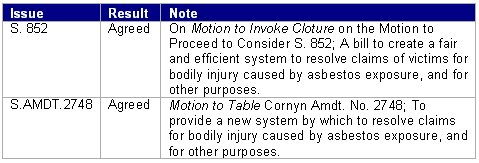Senate Week in Review - February 6-10, 2006
 Last week’s Senate activity centered far more on committee hearings than actions on the Senate floor. Of course, Alberto Gonzales led off the week with a full day of misleading the Judiciary Committee. Then, good old “heck of a job” Brownie showed up at the Homeland Security and Governmental Affairs Committee to totally roll over on George W. Bush and the Homeland Security department.
Last week’s Senate activity centered far more on committee hearings than actions on the Senate floor. Of course, Alberto Gonzales led off the week with a full day of misleading the Judiciary Committee. Then, good old “heck of a job” Brownie showed up at the Homeland Security and Governmental Affairs Committee to totally roll over on George W. Bush and the Homeland Security department.But before we get to that, let’s look at a snapshot of the Senate roll call votes taken February 6-10, 2006:

Votes of Note
Only two roll call votes were cast last week… One was an insignificant cloture vote on another GOP gift to big business, S. 852, the Fairness in Asbestos Injury Resolution Act of 2005. S. 852, which is called “A bill to create a fair and efficient system to resolve claims of victims for bodily injury caused by asbestos exposure, and for other purposes,” will continue to be debated on the Senate floor. The bill, as you can tell by the title language, is intended to keep people with medical conditions from asbestos from actually being able to sue the companies responsible for that exposure.
The measure is sponsored by Arlen Specter (R-PA), 17 Republicans and three Democrats (Leahy. Feinstein and Baucus) and heavily opposed by most on the Democratic side of the aisle.
“This bill, Senate bill 852, wants to change the way people across America will be able to recover for their injuries from asbestos,” said Senator Dick Durbin (D-IL). “The first thing it does is to eliminate your option to go to court. As an American, you could be injured from exposure to some toxic chemical and go to court, have your day in court, and let the court decide. But if you have been exposed to this substance, to asbestos, if this law is passed, you will no longer be able to go to court.”
“What is driving this debate? Why are we so hellbent on passing this legislation at this moment? There are many good reasons, and there are many real reasons. One of the real reasons is that for many of the major corporations in America, this bill is a windfall. Do you think they want to see this bill passed? Why, of course they do. They have an economic interest in it,” concluded Durbin.
Look for more fireworks to come on that one.
The other vote was to table S.AMDT.2748, sponsored by John Cornyn (R-TX), which seeks to replaced Specter’s bill with one that is probably equally bad but that will imposed a medical baseline that must be met before an American injured by asbestos can sue the responsible company. Opposed by the majority of Republicans, who favor S. 852, it was tabled by a vote of 70-27. All Democrats voted to table Cornyn’s bill as it’s not much better than Specter’s legislation and voting to table it at least removes one bad asbestos bill from the Senate radar screen.
Committee Corner
Alberto Gonzales showed up at the Judiciary Committee to do spin control on the domestic spying scandal. I had some observations and excerpts in Gonzales Highlights and Lowlights but no blogger rode this story harder than Glenn Greenwald. In addition to live blogging the Gonzales hearing, Glenn also did some excellent writing on the whole domestic spying mess.
Former CIC (Crony in Charge) of the Federal Emergency Management Agency (FEMA), Michael Brown, appeared before the Homeland Security and Governmental Affairs Committee to discuss Hurricane Katrina response. After being tossed under the bus by Team Bush, Brownie turned on them last week saying that he told Bush immediately how bad Katrina would be.
"I think I told him that we were realizing our worst nightmare, that everything we had planned about, worried about, that FEMA, frankly, had worried about for 10 years was coming true," said Brown.
Brown also made it clear that he felt FEMA was hurt by being placed under the Department of Homeland Security while invoking how a report from FEMA’s Marty Bahamonde, on the ground in New Orleans, was received by the White House.
It's my belief that had there been a report coming out from Marty Bahamonde that said, ‘Yes, we've confirmed that a terrorist has blown up the 17th Street Canal levee,’ then everybody would have jumped all over that and been trying to do everything they could,” testified Brown. “But because this was a natural disaster, that has become the stepchild within the Department of Homeland Security.”
You can read more coverage here and a partial, but very interesting, transcript of the proceedings here.
The Armed Services Committee hearings were mostly uneventful and budget-oriented, save to say that General Peter Pace, Chairman of the Joint Chiefs of Staff, talked up the progress in Iraq a lot while saying very little of what can be done to help troops once they come home. While he thanked the Congress for funding two Amputee Training Centers, he said not one word about the dearth of attention being paid to Post Traumatic Stress Disorder, which will affect tens of thousands more Veterans.
Other Happenings
Senators Ted Kennedy (D-MA) and Russ Feingold (D-WI) took on the big telecommunications corporations for their role in enabling the Bush administration’s illegal domestic spying program. The two Democrats are questioning the companies responsible for providing the NSA access to streams of telephone and Internet traffic entering and leaving the United States and last week sent letters to the chief executives of AT&T, Sprint Nextel and Verizon, asking for answers on their involvement with the NSA.
Asking for a reply before February 17, the letter asks many questions including the following:
“Have government officials requested your company’s cooperation, either in writing or orally, in conducting surveillance of communications in the United States without a court order under the Wiretap Act or FISA, other than requests explicitly stating that they were authorized under the emergency provisions of those Acts? If so, what are the names of those government officials? Please provide the dates of all such requests and subsequent contacts. If any requests have been made in writing, please provide copies of those written requests. If the requests were made orally, please provide a detailed description of the requests.”You can read the text of the Kennedy-Feingold letter at Common Dreams.

















<< Home